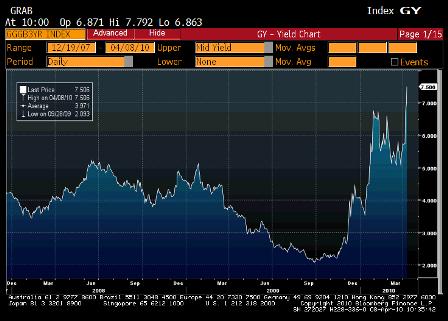>
> (email exchange)
>
> On Sun, Apr 11, 2010 at 10:58 AM, wrote:
>
> What is your call?
>
It’s certainly possible, but my suspicion is that we may be going the way of Japan, with interest rates low for very long. With core CPI going negative and the output gap/unemployment remaining very high, especially people who can’t find full time work hitting a new high of 16.9%, the Fed is far from meeting its dual mandate of full employment and price stability (along with low long term rates). And the recent dollar strength, stubbornly high jobless claims numbers, weak loan demand numbers, and not much sign of life in housing has to be a concern about the recovery being more L shaped than V shaped as well.
Seems the Fed would have to have some pretty strong forecasts for CPI and much higher levels of employment to move any time soon apart from perhaps going to what they consider a more ‘normal’ real rate of 1% or so.
And when I look at the euro dollar rates out past 5 years they’re higher than libor got in the last cycle, and this one doesn’t feel like it’s stronger than the last, at least so far. So to discount rates that high (well over 5%) as midpoints of expectations for fed funds looks high to me.
By Nelson D. Schwartz
April 10 (NYT) — Even as prospects for the American economy brighten, consumers are about to face a new financial burden: a sustained period of rising interest rates.
That, economists say, is the inevitable outcome of the nation’s ballooning debt and the renewed prospect of inflation as the economy recovers from the depths of the recent recession.
The shift is sure to come as a shock to consumers whose spending habits were shaped by a historic 30-year decline in the cost of borrowing.
“Americans have assumed the roller coaster goes one way,” said Bill Gross, whose investment firm, Pimco, has taken part in a broad sell-off of government debt, which has pushed up interest rates. “It’s been a great thrill as rates descended, but now we face an extended climb.”
The impact of higher rates is likely to be felt first in the housing market, which has only recently begun to rebound from a deep slump. The rate for a 30-year fixed rate mortgage has risen half a point since December, hitting 5.31 last week, the highest level since last summer.


